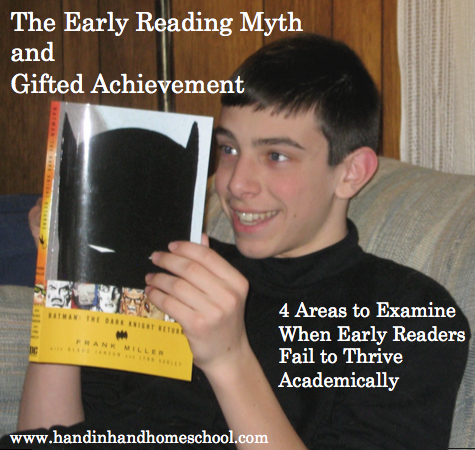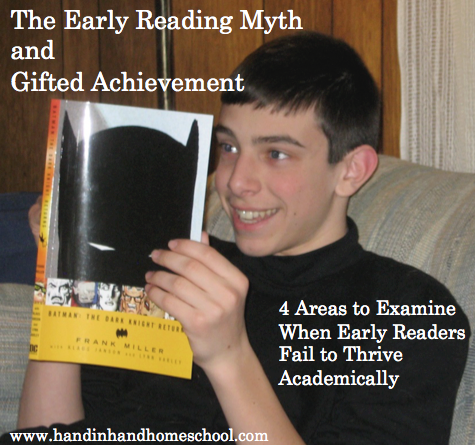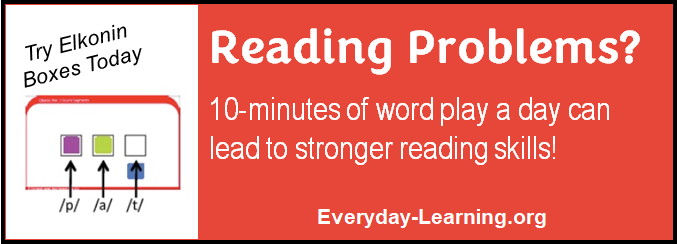The Early Reading Myth and Gifted Achievement

As someone who does educational testing and curriculum planning, I receive my fair share of phone calls and emails from parents who want to better understand their child’s reading ability. The concerns usually fall into 2 camps.
“My daughter hasn’t started reading and kindergarten begins in a couple of weeks. We had her IQ tested and were told she’s highly gifted. Does she have a learning disability?”
“My son started reading at the age of 4. The test said he’s reading at the high school level but he’s having problems passing reading tests in 3rd grade. Does he have a learning disability?”
This week I’m going to focus on questions surrounding early readers who don’t continue on as strong readers in later elementary or middle school years.
Reading before the age of 5 – especially when it’s self-taught – remains a hallmark trait of high intelligence for most people. Yet, the little longitudinal research that exists on precocious readers does not find direct and assured connections between early reading skills and later high academic achievement.
More often than not, most early readers who have been tracked by researchers continue to read above grade level. When compared to more typical students, however, the gap in early reading achievement closes for some gifted kids as they reach middle school. The 1st grader who had been reading at a 6th grade level may now be the 7th grader reading at the 9th grade level.
Some parents of gifted children who begin to notice less stellar reading achievement abilities start to get nervous. Does my child have dyslexia? Is my kid no longer gifted?
My initial answer to most parents is: No. More than likely, nothing is wrong with your child. Lower than expected achievement does not mean a child is no longer gifted. Still, a little at-home sleuthing can help parents decide if formal testing for potential learning disabilities is worth the time and money – OR – if a different approach to reading instruction may be needed.
What to Look For When Your Early Reader Fails to Academically Thrive
Slow Reading Speed
Early reading students can sometimes wow kindergarten teachers with how fast they read words. The kids have either memorized hundreds of words or mastered phonics skills that allows them to whiz through basal reader books. Yet, it’s important to remember that how we measure reading success in later grades varies from those early school years. For starters, sentences become longer and more complex in mid-elementary school. Students have to be able to remember the words and thoughts that came at the beginning of a paragraph in order to understand what they just read. It’s not unusual for students to silently re-read the same sentence more than once to make sure they get it.
Slow reading does not necessarily mean there’s a reading problem. But, listening to your child read out loud can provide you with important information about how they read. Do they skip a lot of words as they read? Are they switching letters within words or substituting similar looking or sounding letters? Or, are they simply reading slowly and struggling to decode longer, unfamiliar words? The answers to these questions can shed light on whether there may be an underlying learning disablity or if your child is simply savoring the books they read.
Poor Spelling
Some precocious readers seemingly “break the code” at an early age and wind up reading Harry Potter in the back of their kindergarten classroom while their age-mates struggle to sound out c-a-t. Yet, by 4th grade these same kids can’t seem to spell to save their lives. While it might seem counter-intuitive to talk about phonics with a child who’s been reading since age 4, it’s an important question to bring up. Some early readers fail to receive full phonics instruction and as a result they struggle to read complex words and/or correctly spell.
Analyzing spelling errors can help pinpoint where a disconnect may lie. If problems seem to be focused on complex vowel patterns, like controlled-R and vowel digraphs like “aw”, then perhaps some targeted instruction may likely solve the problem. If the spelling problems are more universal and include mistaking even short-vowel sounds, then you may want to look at formal testing to see what underlying issues may be causing the problem.
Repeatedly Re-Reading Low-Level Books
Just because a gifted child can read high-level material does not mean they can or should be reading such dense tomes all the time. Take the 11-year old who spent the summer reading through The Communist Manifesto and Adam Smith’s Wealth of Nations with a mentor – only to curl up at night with a treasured copy of The Magic Treehouse. No question existed in anyone’s mind about the child’s enthusiastic ability to understand the political and economic principles. But, you can’t ignore the fact that such reading and analysis is a taxing experience, even for adults. It’s a form of mental calisthenics that can leave a person tired and weary. Just as some people like to relax in a hot tub after a long workout, some kids like to wrap their minds in a cloak of fond reading memories. It can be a gentle reassurance of the underlying comfort that they have always found in reading.
Talking to your child in a friendly way about why they choose low-level books may give you insight into whether they’re self-selecting down to a more appropriate reading challenge or just visiting with an old friend, so to speak.
Unable to Answer Comprehension Questions
Many parents of gifted early readers are thrilled when their little ones pick out thick books on advanced topics at the library – but they don’t always stop to check and see how much the kids actually take away from the text. Don’t be fooled by the casual chattiness. Bright kids know how to glean lots of information by studying pictures, charts, and other graphics that fill the pages of many non-fiction books.
Reading comprehension is actually a set of analytical skills that can and should be taught to gifted students. If you’re seeing inconsistent comprehension with your reader, go back to the actual book and ask them about what they read. Start by asking basic questions that cover information that is explicity stated in the text. WHO is the story about? WHEN did the story happen? WHAT happened at the end? Next, ask them thinking questions that require them to connect ideas together. HOW did someone accomplish a certain task? WHY would a certain event take place? Finally, ask evaluative questions that compel the reader to think at their deepest level. DO YOU THINK the character made the right choice? WHAT OTHER OPTIONS could have been considered?
Interestingly, some younger highly gifted students initially struggle with more advanced comprehension questions. It’s not about lack of ability. Instead, they’ve come to rely on looking for black and white answers that they’re not always comfortable with the more grayscale areas.
Early reading indicates at least a moderate level of giftedness, but it does not always lead to a life-long passion for reading or even to high academic achievement. Some gifted kids need direct instruction to help them continue to excel with their reading abilities. Others may have an underlying learning disability that requires different instructional methods. And, of course, there will always be the children who have no problems. They are right where they should be academically.
Do you have a highly or profoundly gifted child who isn’t reading, yet – and kindergarten is right around the corner? Check out Part 2 of the Early Reading Myth and Gifted Children.

This blog post is part of the HoagiesGifed July Blog Hop. Visit Hoagies’ Blog Hop home page to read more about (summer) reading and gifted children, written by other professionals and parents of gifted kids.
- 5 Types of Reading Comprehension
Using the story of Cinderella, learn how you ask different types of comprehension questions to tap higher order thinking.
- Reading Miscues
How to identify oral reading miscues and what those miscues tell you about your child’s reading ability.






Great points about the concerns related to early reading, what it supposedly predicts, and what happens next. My post in this blog hop is along these same lines, with a look at concerns when gifted children don’t read at an early age. No matter what, parents definitely stress over where their children stand on the continuum.
Gail Post/ http://www.giftedchallenges.com
Gail, Thanks so much for stopping by the blog hop and chiming in. You are so right that many parents stress about their children and their academic achievement, regardless of where they fall. We all want the best for our kiddos and it’s easy to become concerned when certain expectations are not initially met. Next week I’ll also be writing about non-early reading gifted kids and why it’s not an automatic detriment to future success when bright kids don’t start reading until after the age of 5.
Thanks for your very insightful post!
Yes, some people focus so much on whether or not their child is an early reader, to the exclusion of everything else.
Love that you suggested resources, as well as what parents should look for when their child fails to academically thrive.
I will plan on sharing a link to your post on this topic when we host our parent meetings this fall, as our pilot program will be accepting twice exceptional learners in addition to children who have been found to be highly, exceptionally, and profoundly gifted.
The books you have listed would be a nice addition to our bookshelf of parent resources.
Have a happy rest of your week!
Colleen
Sunrise Learning Lab
Both our girls taught themselves to read around 3 or 4. It kinda felt like I missed out on some hallmark thing by not teaching them to read. The youngest isn’t enamored with it the way her sister is, mostly because she’s just a different kind of person. While she does have a visual processing disorder, I’m not sure she’d ever really sit still long enough to read the way her sister does, unless she could read while she walks (like I used to do…I wouldn’t recommend it, though, since I managed to break an ankle doing it 🙂 ). Some kids are just different. Doesn’t make them any less gifted.
It’s always a warmly appreciated compliment when someone takes the time to let me know they’ll be sharing my work as a resource for other families. If parents are genuinely concerned with a possible dyslexia diagnosis, I highly recommend the Shaywitz Overcoming Dyslexia book. It is the “gold standard” starting place to learn more about identification of reading disabilities, as well as best practices for helping kids overcome that obstacle.